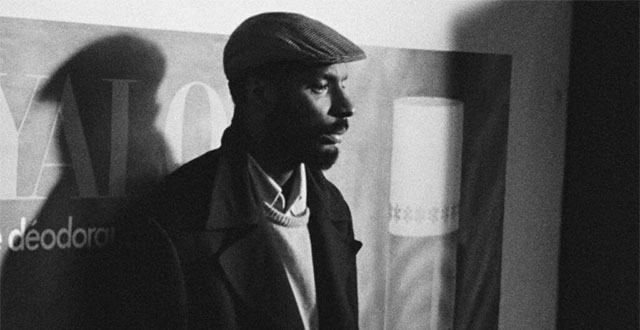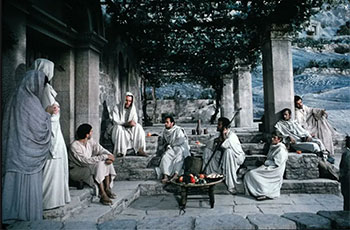
SOLEIL O FINDS THE LIGHT OF DAY
Kirk Michael 03/04/2021“Soleil Ô,” one of the many lost or nearly lost films that Martin Scorsese has helped pull from obscurity as part of the World Cinema Project, reveals Mauritian writer/director Med Hondo as furiously political but also furiously creative. Originally released in 1967, explanatory text confides that the film was found, “in the audiovisual archives of the Paris chapter of the Communist Party.”
And the story itself is as wild as its rediscovery, with no strict narrative progression but many arresting scenes. Take an early sequence where a group of African migrants are baptized into the Christian faith and piously carry wooden crosses around the churchyard… only to break into military formation, flip the crosses the other way, and use them to practice sword fighting.
It’s hard to know the names of individual characters (no one is properly introduced) but for the most part we tag along with our unnamed African protagonist (Robert Liensol) as he searches for work and lodging in a hostile Paris. Our man is a trained accountant but he never gets the chance to interview for any jobs listed in the newspaper. He recurringly meets a Black street sweeper, whose wry smile shows how far we are from the French promise of liberté, égalité, fraternité. The larger group of fellow migrants serves as a sort of chorus, joining our hero whether he finds himself in a cathedral or cramped apartment for a meeting of communist revolutionaries.
Hondo himself does the voiceover narration and it’s filled with aphorisms like, “I am bleached by your culture but I remain a negro.” He made the film in a period when African immigration to France was ramping up, with some 300,000 migrants entering the country each year. In a series of coy interview-style scenes we see White women muttering, “There are too many already,” before suggesting the government might have to “herd them like American Indians.” They also giggle over base assumptions about the sexual prowess of Black men and Hondo displays his brutal humor when he overlays a meeting of our hero and a White woman with a soundtrack of barnyard noises. Later, a White barfly says, “I love negro spirituals” in the same way that Bradley Whitford’s liberal dad said in “Get Out,” “I would have voted for Obama for a third term if I could.”
Hondo’s cinematographic choices also fascinate — even some seemingly simple two-shots of dialogue are complicated by many pans and zooms, with the camera archly landing in uncomfortable closeup as an interlocutor insists only the “most useful” migrants should come to France. Sometimes we get improvised, neorealistic shots of neighborhood life interspersed with a pastiche of ecstatic fantasias, as when a Black man playing a soldier dies only to be resurrected by a single franc note.
While “Soleil Ô” can sometimes bewilder, you’re pulled along by its scruffy charm. After a truly audacious ending, a title card promises “To be continued.” Unfortunately, there’s no sequel available to watch, although the brutal legacy of European colonialism is ongoing.
“Soleil Ô” is streaming on the Criterion Channel. Not rated. Running time 1:48.
Visit www.criterionchannel.com
